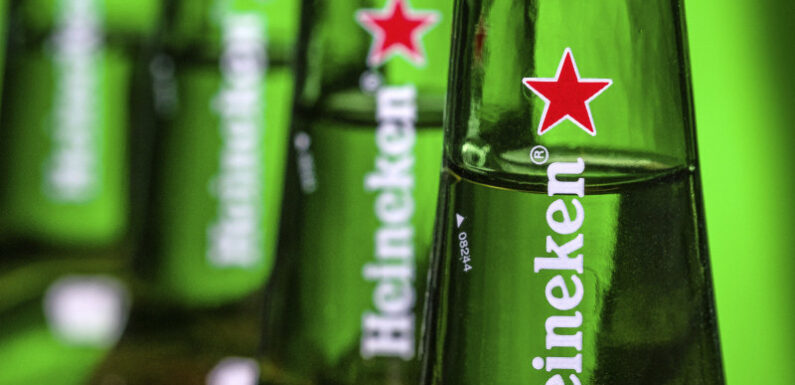
Save articles for later
Add articles to your saved list and come back to them any time.
For the price of a single euro, Heineken has sold its operations in Russia, completing an exit the giant Dutch brewer first announced within weeks of Russia’s full-scale invasion of Ukraine last year.
Heineken said it sold its seven breweries and other assets in Russia to Arnest Group, a packaging and consumer goods business based in Stavropol, Russia. The €1 ($1.69) deal will result in a loss of €300 million, the company said, adding the buyer would take responsibility for Heineken’s 1800 employees in Russia, guaranteeing their jobs for three years.
Heineken has finally exited the Russian market. Credit: Bloomberg
“While it took much longer than we had hoped, this transaction secures the livelihoods of our employees and allows us to exit the country in a responsible manner,” Dolf van den Brink, Heineken’s CEO, said in a statement.
After Russia’s invasion of Ukraine in February 2022, hundreds of Western companies announced they would quit operating in Russia, but actually selling their assets and withdrawing has taken time.
Under new rules put in place by the Kremlin after the imposition of Western sanctions over the invasion, foreign companies can only sell their local assets with approval from Russia’s Finance Ministry, which can take six to 12 months. Businesses in certain sectors, including oil and banking, also need a sign-off from President Vladimir Putin. And some companies have delayed their withdrawal until a suitable employer is found for their workers.
Dutch brewer Heineken has completed its withdrawal from Russia, 18 months after Moscow launched its full-scale invasion of Ukraine.Credit: AP
Critics say the delays suggest an unwillingness to leave, and Heineken faced a boycott after news media reports said that its Russian subsidiary kept selling Dutch beer Amstel last year.
On Friday, the brewer said that the Heineken brand had been removed from Russia last year, and that production of Amstel would “be phased out within six months”. It said the sale would have a negligible effect on the group’s earnings, and that its full-year forecast for earnings in 2023 was unchanged.
For Arnest, it was at least the second time it has picked up the Russian subsidiary of a Western company. In September, it acquired the Russian operations of Ball Corp, a Colorado-based manufacturer of containers. The $US530 million ($827 million) deal included three plants producing aluminum cans for beer and soft drinks in Moscow, Leningrad and the Chelyabinsk regions, Arnest said.
This article originally appeared in The New York Times.
Most Viewed in World
Source: Read Full Article

